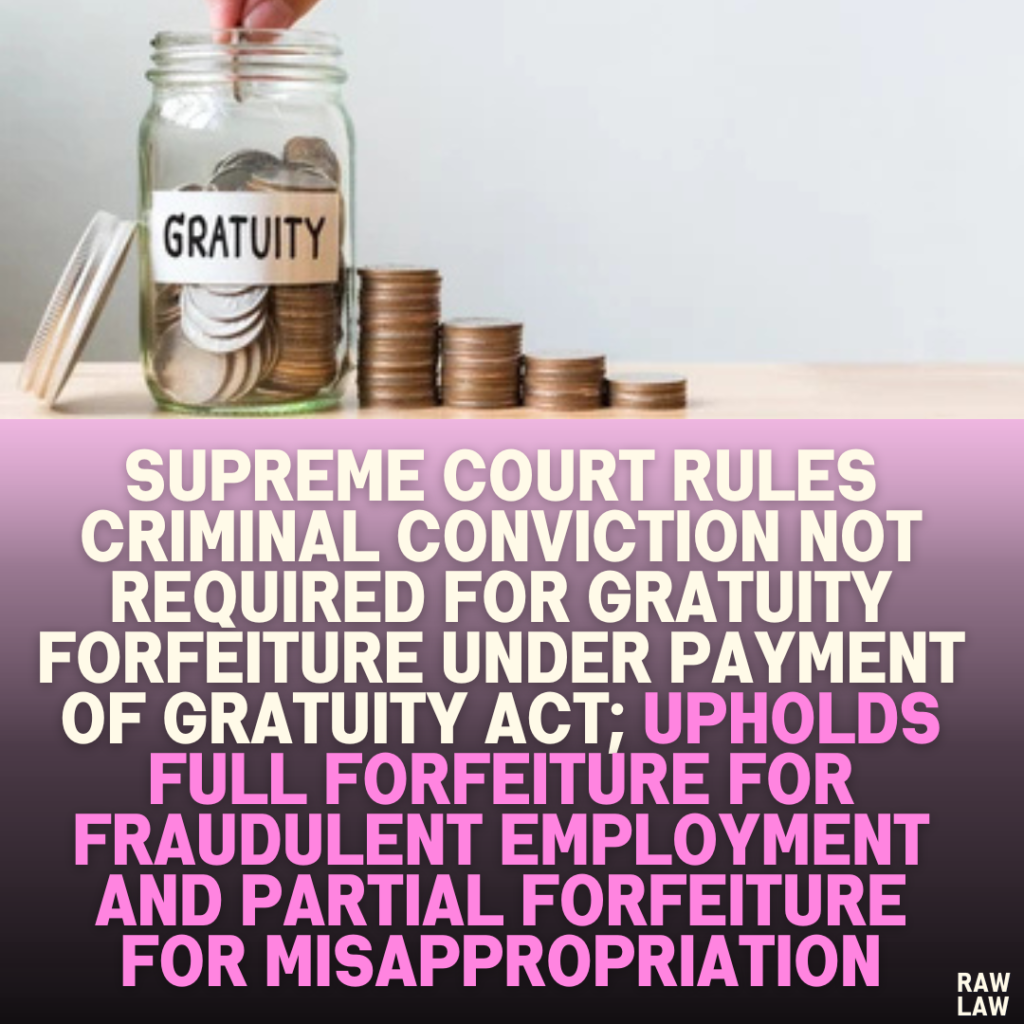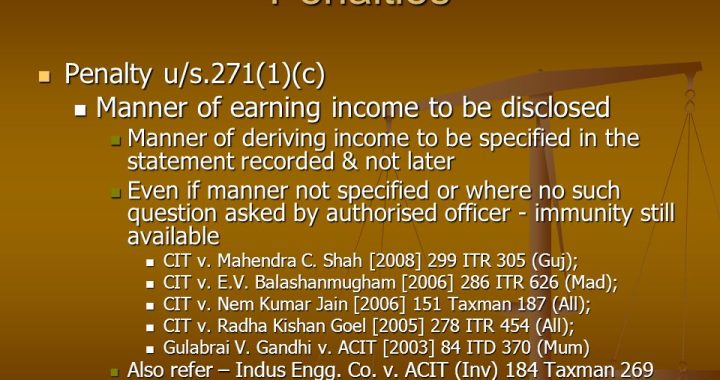Employer can forfeit gratuity of an employee in case of moral turpitude

employer can forfeit gratuity of an employee in case of moral turpitude
On February 17, 2025, the Supreme Court of India delivered a significant judgment regarding the forfeiture of gratuity under the Payment of Gratuity Act, 1972. This ruling clarified that employers can deny gratuity payments if an employee is dismissed for misconduct involving moral turpitude, without the necessity of a criminal conviction. This judgment clarifies the interpretation of Section 4(6)(b)(ii) of the Payment of Gratuity Act, 1972, which permits the forfeiture of gratuity if an employee is terminated for an act constituting an offense involving moral turpitude during their employment.
This decision overturns a previous precedent set in 2018, which required such misconduct to be proven in a court of law.
Summary of the Judgment
The case involved an employee of a Public Sector Undertaking (PSU) who was terminated after it was discovered that he had falsified his date of birth to secure employment. The disciplinary committee found that this act constituted moral turpitude, leading to the forfeiture of his gratuity. The Supreme Court ruled that the forfeiture could be upheld based on internal disciplinary proceedings rather than requiring a criminal conviction.
The case originated from appeals filed by Western Coalfields Ltd. and the Maharashtra State Road Transport Corporation (MSRTC). In one instance, an employee was dismissed for securing employment using a fraudulent date of birth certificate. In another, bus conductors were terminated for misappropriating fares collected from passengers. The central issue was whether gratuity could be forfeited in such cases without a criminal conviction.
Key Points from the Judgment:
- Moral Turpitude Defined: The Court emphasized that moral turpitude refers to conduct that is contrary to community standards of justice, honesty, or good morals. In this case, the employee’s act of falsifying documents was deemed to fall within this definition.
- No Criminal Conviction Required: The Court stated that Section 4(6)(b)(ii) of the Payment of Gratuity Act does not stipulate that a criminal conviction is necessary for gratuity forfeiture. Instead, it allows for forfeiture if the misconduct constitutes an offence involving moral turpitude, as determined by the employer’s disciplinary authority.
- Precedent Overturned: This ruling effectively nullifies the earlier Supreme Court judgment in Union Bank of India vs. C.G. Ajay Babu (2018), which mandated that moral turpitude must be established through criminal proceedings. The current judgment clarifies that such a requirement was merely an obiter dictum and not binding.
- Principles of Natural Justice: While employers can now forfeit gratuity without a criminal conviction, they must still adhere to principles of natural justice. This includes providing notice to the employee and allowing them to present their case regarding the nature of the misconduct and any potential forfeiture.
- Sympathetic Consideration: The Court advised that while gratuity can be forfeited, employers should consider a sympathetic approach when determining how much should be forfeited. In this case, it ordered that 75% of the gratuity be paid to the employee, with only 25% being forfeited.
Implications of judgment for Employees and Employers
The judgment has far-reaching implications for both employees and employers:
For Employees: Employees may find their gratuity rights more vulnerable if dismissed for misconduct involving moral turpitude, as employers now have greater leeway to forfeit these payments without needing a criminal conviction.
For Employers: This ruling empowers employers to take decisive action against employees whose misconduct involves moral turpitude, without the necessity of a protracted criminal trial. It underscores the importance of integrity in the workplace and provides clarity on the legal framework governing gratuity forfeiture. Employers are, however, advised to ensure that disciplinary proceedings are conducted fairly and that decisions to forfeit gratuity are based on substantial evidence of misconduct.
Forfeiture of Gratuity- Cases Referenced by Supreme Court
The Supreme Court’s decision heavily referenced its previous ruling in Union Bank of India vs. C.G. Ajay Babu (2018). In that case, it was held that an act constituting moral turpitude must be established through court proceedings before gratuity could be forfeited. The current judgment clarifies that this requirement was not a statutory necessity but rather an interpretative remark lacking binding authority.
This new ruling marks a pivotal change in employment law regarding gratuity and sets a precedent for future cases involving similar issues of moral turpitude and employment misconduct.
Implications of the Judgment
This ruling empowers employers to take decisive action against employees whose misconduct involves moral turpitude, without the necessity of a protracted criminal trial. It underscores the importance of integrity in the workplace and provides clarity on the legal framework governing gratuity forfeiture. Employers are, however, advised to ensure that disciplinary proceedings are conducted fairly and that decisions to forfeit gratuity are based on substantial evidence of misconduct.
The Supreme Court’s decision marks a significant development in labor law, balancing the rights of employees with the need for ethical conduct in professional environments.


 ITAT Amritsar: No Section 269SS Violation for One-Time Cash Payment Before Sub-Registrar
ITAT Amritsar: No Section 269SS Violation for One-Time Cash Payment Before Sub-Registrar  Tax Officials Unleash Digital Dragnet: How New Raid Powers Redefine Privacy, Property Rights in India and likely to Fuel Corruption
Tax Officials Unleash Digital Dragnet: How New Raid Powers Redefine Privacy, Property Rights in India and likely to Fuel Corruption  Income Tax Department Rewards for Reporting Tax Evasion: A Comprehensive Guide
Income Tax Department Rewards for Reporting Tax Evasion: A Comprehensive Guide  Forfeiture of Gratuity by Employer- What are the Remedies for an employee- Can employer be challenged?
Forfeiture of Gratuity by Employer- What are the Remedies for an employee- Can employer be challenged?  Diving Deeper: The Impact of the New Tax Bill on Dairy and Farming Income
Diving Deeper: The Impact of the New Tax Bill on Dairy and Farming Income  Bombay High Court Upholds Section 271(1)(c) Penalty for Deliberate Non-Disclosure
Bombay High Court Upholds Section 271(1)(c) Penalty for Deliberate Non-Disclosure